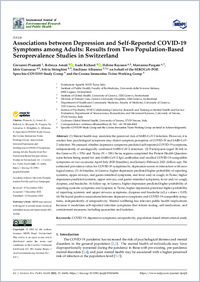Associations between depression and self-reported COVID-19 symptoms among adults : results from two population-based seroprevalence studies in Switzerland
- Piumatti, Giovanni Fondazione Agnelli, Turin, Italy
- Amati, Rebecca ORCID Institute of Public Health (IPH), Università della Svizzera italiana, Switzerland
- Richard, Aude Institute of Global Health, University of Geneva, Switzerland
- Baysson, Hélène Division of Primary Care, Geneva University Hospitals, Switzerland - Department of Health and Community Medicine, Faculty of Medicine, University of Geneva, Switzerland
- Purgato. Marianna Section of Psychiatry, WHO Collaborating Centre for Research and Training in Mental Health and Service Evaluation, Department of Neuroscience, Biomedicine, and Movement Sciences, University of Verona, Italy - Cochrane Global Mental Health, University of Verona, Italy
- Guessous, Idris Division of Primary Care, Geneva University Hospitals, Switzerland - Department of Health and Community Medicine, Faculty of Medicine, University of Geneva, Switzerland
- Stringhini, Silvia Division of Primary Care, Geneva University Hospitals, Switzerland - Department of Health and Community Medicine, Faculty of Medicine, University of Geneva, Switzerland
- Albanese, Emiliano ORCID Institute of Public Health (IPH), Università della Svizzera italiana, Switzerland - Institute of Global Health, University of Geneva, Switzerland
- 2022
Published in:
- International Journal of Environmental Research and Public Health. - 2022, vol. 19, p. 16696
English
(1) Mental health may modulate the perceived risk of SARS-CoV-2 infection. However, it is unclear how psychological symptoms may distort symptom perception of COVID-19 and SARS-CoV-2 infection. We assessed whether depressive symptoms predicted self-reported COVID-19 symptoms, independently of serologically confirmed SARS-CoV-2 infection. (2) Participants (aged 20–64) in the Geneva (N = 576) and Ticino (N = 581) Swiss regions completed the Patient Health Questionnaire before being tested for anti-SARS-CoV-2 IgG antibodies and recalled COVID-19-compatible symptoms on two occasions: April–July 2020 (baseline), and January–February 2021 (follow-up). We estimated prevalence ratios for COVID-19 symptoms by depression scores in interaction with serological status. (3) At baseline, in Geneva, higher depression predicted higher probability of reporting systemic, upper airways, and gastro-intestinal symptoms, and fever and/or cough; in Ticino, higher depression predicted systemic, upper airways, and gastro-intestinal symptoms, fever and/or cough, dyspnea, and headache. At follow-up, in Geneva, higher depression predicted higher probability of reporting systemic symptoms and dyspnea; in Ticino, higher depression predicted higher probability of reporting systemic and upper airways symptoms, dyspnea and headache (all p values < 0.05). (4) We found positive associations between depressive symptoms and COVID-19-compatible symptoms, independently of seropositivity. Mental wellbeing has relevant public health implications because it modulates self-reported infection symptoms that inform testing, self-medication, and containment measures, including quarantine and isolation.
- Collections
- Language
-
- English
- Classification
- Medicine
- License
- Open access status
- gold
- Identifiers
-
- DOI 10.3390/ijerph192416696
- ARK ark:/12658/srd1331765
- Persistent URL
- https://n2t.net/ark:/12658/srd1331765
Statistics
Document views: 60
File downloads:
- Albanese_2022_MDPI_ijerph_Associations between depression: 25
